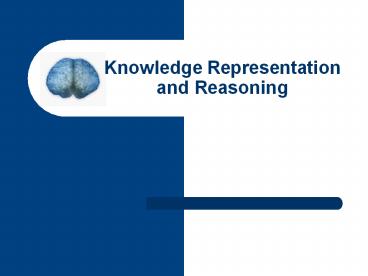Knowledge Representation and Reasoning - PowerPoint PPT Presentation
Title:
Knowledge Representation and Reasoning
Description:
How to fail this class. What is knowledge? General Information ... his student, created the field of epistemology the study of the nature of knowledge ... – PowerPoint PPT presentation
Number of Views:201
Avg rating:3.0/5.0
Title: Knowledge Representation and Reasoning
1
Knowledge Representation and Reasoning
2
Overview
- Contact Information
- Grading policy
- Syllabus
- How to fail this class
- What is knowledge?
3
General Information
- Instructor Lee McCauley
- 374 Dunn Hall
- 678-2486
- mccauley_at_memphis.edu
- Office Hours Tue. Thur. 100 230
4
Evaluation
- Class Participation 20
- Model Presentations 20
- Project Write-up 20
- Project Code/Demo 20
- Homeworks 20
5
Syllabus
- Refer to your handouts
6
How to fail this class
- Dont show up
- Dont take the project seriously
- Dont do the homework
- Come ill-prepared for presentations
7
What is knowledge?
- Discussion
8
Historical Background
- Socrates began the art of rhetoric in the fifth
century BC and died for corrupting the minds of
Athenian youth - Plato, his student, created the field of
epistemology the study of the nature of
knowledge - Aristotle, Platos student, (who did not want to
die) shifted the emphasis from the nature of
knowledge to the representation of knowledge
9
Tentative Definition
- Justified belief that increases an entities
capacity for effective action (Nonaka 1994, Huber
1991)
10
Data, Information, and Knowledge
- Data
- Raw material/sensation
- Information
- Categorized data
- Data with meaning that may change knowledge
- Knowledge
- Actionable information
- What to do with the information
- Information that can be reasoned to be either
true or false
11
Early AI enthusiasms
- Logic and theorem proving eagerly adopted
- Computational issues forced consideration of how
to package up knowledge, control inference - Frame languages
- Special-purpose KR languages
- Formalists versus Hackers
12
Form minus content
- Movement in 1980s KR Formal KR
- Reaction to lack of clear semantics
- Identification of formality with precision
- Focus on general logical schemes, not specific
domains - Consequences
- Lots of technical progress
- Common perception of sterility in many areas,
e.g. nonmonotonic logics - Most exciting KR work didnt appear in KR
community, e.g., qualitative physics, CYC
project, ...
13
The Representation Resurgence
- Representation Lite hits too many walls
- Web search engines adding more semantics along
with statistical techniques - Dramatic success stories in narrow areas
- Scheduling Desert Shield, Detecting money
laundering, Detecting stolen credit cards - Steady scientific progress in AI
- KR now embracing content again
- Moores law is making it all practical
14
The Future of KR
- Ideas, technologies, and tools now coming
together - Clear perception arising of need for common sense
knowledge bases - Keeping up with the Web NLP rises again!
- See Semantic Web, DAML projects
- Software that you treat as a collaborator
- Knowledge management
- The infrastructure is being created today
- Those who understand KR will shape what happens
15
What this course is about
- You will learn how to represent knowledge very
precisely - So precisely that computer programs can use it
- You will learn state of the art representation
schemes for core kinds of knowledge - Space, time, quantity, events, causality, common
sense - You will learn how to program in a powerful KR
language - Prolog





























![Artificial Intelligence Lecture 8: [Part I]: Selected Topics on Knowledge Representation PowerPoint PPT Presentation](https://s3.amazonaws.com/images.powershow.com/7421234.th0.jpg?_=20151128083)

